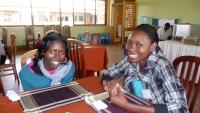Capacity Building

Improving Health Care Delivery to Teens in Uganda
More than a quarter of the population of Uganda is between the ages of ten and 19. Compared to other age groups, adolescents often lack the knowledge and maturity to make sound and informed decisions without extensive support, making them susceptible to increased morbidity and mortality due to poor choices and increased risk-taking behaviors. In addition to these developmental vulnerabilities, Ugandan adolescents also face other hardships, including poverty, unemployment, lack of education, poor access to medical services, lack of sex education, and inadequate knowledge about the consequences of risk-taking behaviors. Betsy Pfeffer, MD has focused her efforts on the needs of adolescents in Uganda through the Society of Adolescent Health in Uganda (SAHU), which she co-founded in 2012 through collaborations with Makerere University College of Health Sciences and the Naguru Teenage Information and Health Centre. Through SAHU, Dr. Pfeffer and her colleagues organize an annual adolescent health conference in Kampala, conduct research, and disseminate knowledge through newletters, online resources, and collaborations with local organizations.
Contact
Betsy Pfeffer, MD
bp35@cumc.columbia.edu
Improving Care by Teaching the Teachers
The American Austrian Foundation (AAF)'s Open Medical Institute brings doctors from the West together with those from the former Soviet republics, China, Africa, and Central America, for educational sessions designed to foster “brain gain” in those countries. Since 1993, almost 14,000 young doctors have attended the seminar series. They come away better able to educate other physicians and to provide improved care in their countries. Neonatologist Richard Polin, MD has directed the AAF’s courses in neonatology for the past two decades, and several of the AAF fellows he has worked with are now national leaders in the field in their countries. The intensive interactions between the participants and faculty, and the lectures, discussions, case presentations, and simulations, allow for rich exchanges, and have led to friendships that have lasted for years.
Contact
Richard Polin, MD
rap32@cumc.columbia.edu

Teaching Neonatal Palliative Care Worldwide
Across the globe, babies who are prenatally or postnatally diagnosed with life-limiting or life-threatening conditions need palliative care. Perinatal and neonatal palliative interventions do not require advanced technology or great financial support. They do, however, require high-quality professional knowledge and experience. Through her International Comfort Care Project Elvira Parravicini, MD, along with the Neonatal Comfort Care (NCC) team at Columbia University Irving Medical Center (CUIMC), has been developing an international standard of care for the treatment of newborns with short life expectancy by means of several educational projects. Dr. Parravicini and her team provide an annual workshop at CUIMC, open to local, national, and international professionals and students, providing attendees an opportunity to become proficient in perinatal and neonatal palliative care via formal lectures and hands-on training. The same curriculum is offered to national and international institutions to provide education and training ‘in loco’. Over the past seven years Dr. Parravicini and her team have served as consultants for model replication in Italy, Ireland, Russia, Sweden, Switzerland, and Africa.
Contact
Elvira Parravicini, MD
ep127@cumc.columbia.edu
A Collaboration on Immunology and Genetics in Chile
Columbia University Irving Medical Center (CUIMC) recently launched an academic and research collaboration agreement with Chile’s Universidad del Desarrollo (UDD), the School of Medicine Clínica Alemana-UDD, and the Institute of Sciences and Innovation in Medicine (ICIM). The agreement includes joint research and educational activities as well as possible student and practitioner exchanges to explore topics including precision medicine in primary immunodeficiencies; gene discovery in primary and immune dysregulation syndromes including allergies; autoimmune diseases focusing on exome sequencing and interpretation; and state-of-the-art strategies for diagnosis and targeted treatments. The collaborators are co-sponsoring a major symposium in November 2018 in Santiago entitled, "Immunodeficiencies and Immune Dysregulation: from Translational Immunology to personalized Medicine." Participants will include Jordan Orange, MD, PhD, Chair of Pediatrics; Wendy K. Chung, MD, PhD, clinical and molecular geneticist and the Kennedy Family Professor of Pediatrics and Medicine; and Lawrence Stanberry, MD, PhD, former Chair of Pediatrics.
Standardizing Evaluation and Treatment of PCOS Across the Globe
Polycystic ovary syndrome (PCOS) is the most common endocrinopathy of reproductive-aged women worldwide. PCOS is a complex hormonal disorder including reproductive, metabolic, and psychological features, and clinical practice in the assessment and management of the disorder has been inconsistent internationally. Pediatric diagnosis in particular has been inconsistent across practices as a result of preconceived general practice plans. Sharon E. Oberfield, MD has been involved in multiple global initiatives to standardize PCOS clinical practice using evidence-based definitions and management approaches. She is a member of the International PCOS Network, which includes collaborators in over 20 countries. Their work culminated in the 2018 “Evidence-Based Guideline for the Assessment and Management of PCOS.”
Contact
Sharon E. Oberfield, MD
seo8@cumc.columbia.edu